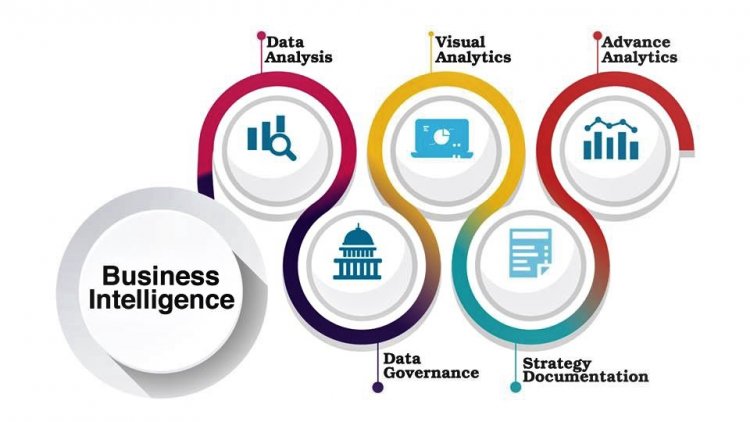Business Intelligence
Business intelligence is described as the process of gathering and analysing business data in order to gain insights that can help successful management decisions.

To collect information, business intelligence relies on the method of business analysis. The analysis of collected data using comprehensive technological methods aids in the generation of relevant insights.
The aim of business intelligence is to gather and evaluate information so that a foresighted company like yours can make better business decisions. Some of the most recent business intelligence developments are as follows:
- Increased investment in artificial intelligence technologies.
- Huge quantities of info.
- The growing significance of data governance.
- Boost the availability of self-service business intelligence applications and tools.
- Data interpretation by narration
- Cloud analytics Collaborative market intelligence Embedded business intelligence
Without any, one of the most significant parameters for success in today's dynamic business environment is the ability to leverage data and technology in real-time. It makes no difference what sector you represent; what matters is easy access to data. There are various online business intelligence resources available from which you can navigate multiple ways to gain business insights; below are some of the most highly recommendable methodologies for gaining business intelligence.
A) Data collection
1. Surveys
-Web/online surveys – The most dependable, cost-effective, and commonly used means of reaching a wider audience for data collection remains the online survey.
-In-person surveys – These are face-to-face interviews.
-Mail surveys – This is a time-honored way of collecting information from a wide number of people.
-Telephone surveys are marginally more costly than online surveys but much less expensive than face-to-face surveys.
2. Questionnaires
A questionnaire is a set of questions used for research purposes that can be both qualitative and quantitative in nature.
3. Polls
Polls are a bit different from surveys because they normally consist of just one question. Polls have a very high level of reliability since they are simple to respond and take very little time.
4. Forms
Forms are a type of survey but they are usually used to gather detailed information from respondents in each field such as age, income, gender, and so on.
B) Analysing
This is the point at which all of the data is merged into a single platform. A Business Intelligence software would enable you to collect and analyse data using advanced analytical tools that are built into the software. Analysing data obtained through different approaches assists a company in recognising their consumers' views and finding areas for change.
C) Tracking and presentation
Following analysis, the next step is to comprehend what the metrics represent. This is the most essential move, since incorrect data interpretation may take your organisation off the rails. Converting information into visual infographics may also help people understand it better.
Advantages in business intelligence
- Business intelligence has a significant effect on strategic, tactical, and operational business decisions in an enterprise.
- Good Business Intelligence software will help you increase your productivity.
- It gives an organisation a comprehensive view of the organisation, segmented into different divisions, goods, services, and so on.
- Advanced automated analytics can be used to streamline complex organisational processes.
- BI software can produce visual infographics, allowing even non-technical people to understand the data.

 Mr.Biller Team
Mr.Biller Team 































